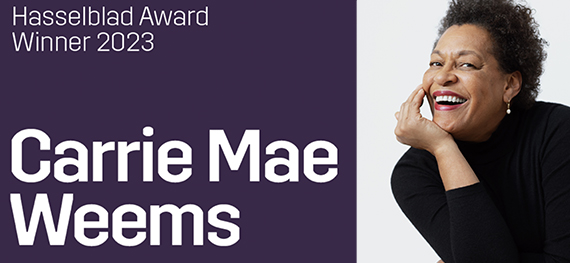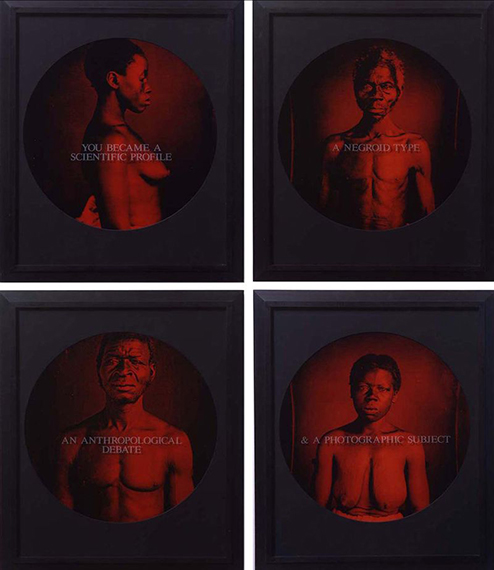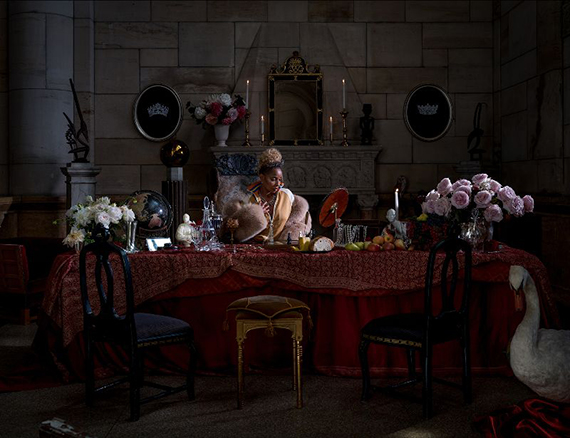
Carrie Mae Weems »
Carrie Mae Weems: the 2023 Hasselblad Award laureate
Award:
Fri 13 Oct
Hasselblad Center
Ekmansgatan 8 / Götaplatsen
412 56 Göteborg
+46 31-203530
web@hasselbladfoundation.org
www.hasselbladfoundation.org
Tue, Thu 11-18 . Wed 11-21 . Fri-Sun 11-17

A Photographic Subject from the series From Here I Saw What Happened and I Cried, 1995 – 96
© Carrie Mae Weems. Courtesy of the artist and Jack Shainman Gallery, New York.
The Hasselblad Foundation is delighted to announce Carrie Mae Weems as the 2023 Hasselblad Award laureate. She receives a gold medal and the sum of SEK 2,000,000. The award also includes a medium format Hasselblad camera from the Gothenburg-based camera company Hasselblad.
The award ceremony will take place in Gothenburg, Sweden on 13 October 2023. That same day, an exhibition of Carrie Mae Weems’s work will open at the Hasselblad Center and a new publication about the artist will be released.
The Hasselblad Foundation’s citation regarding the Hasselblad Award laureate 2023, Carrie Mae Weems
Carrie Mae Weems’s work has for decades anticipated salient issues of our time – the struggle for racial equality and human rights – with unflinching visual and ethical force. Her artistic practice is inherently activist, poignant, and lyrical. She creates evocative, potent tableaux and confronts painful histories, institutional power, and social discriminations. At the core of Weems’s wide-ranging oeuvre is the still photograph, but she also deftly employs video, text, immersive multimedia installations, and performance. She often inserts herself in her work, thus embodying and commemorating the Black female subject.
Carrie Mae Weems: “In the midst of the radical shifts taking place across cultural institutions, and as the first African American woman to receive the Hasselblad Award, some might say, ‘it’s about time!’ Nevertheless, receiving the Hasselblad Award has left me speechless. I don’t have the words to express the depth of my gratitude. To have my family name inscribed on this historic roster, alongside some of the most outstanding photographers of our time, is a cherished honor. To be recognized comes with the continued responsibility to deliver on the promise made to myself and to the field, which is to shine a light into the darker corners of our time and thereby, with a sense of grace and humility, illuminate a path forward. For this honor, I thank the Hasselblad Foundation and the jury.”
Jury chair, Joshua Chuang: “When Carrie Mae Weems first appeared on the scene four decades ago, her work was instantly iconic, even if it took time for the world to recognize it as such. As her vision has evolved in intuitive, unpredictable ways, it has only become more essential.”
Christina Backman, Managing Director, Hasselblad Foundation:
“Carrie Mae Weems is an icon in her field. Her personal and political work has inspired many younger, especially female photographers, in the past 40 years. We are extremely happy that she is this year’s Hasselblad Award winner.”

© Carrie Mae Weems. Courtesy of the artist and Jack Shainman Gallery, New York.
Carrie Mae Weems lives in Syracuse, New York. She was born in 1953 in Portland, Oregon, to a family with sharecropper roots in the American South. After high school, Weems moved to San Francisco to study modern dance and became politically active as a union organizer while working in a clothing factory to support herself. Weems received her first camera as a twenty-first birthday present and initially used it as a tool for political rather than creative purposes. Only later did she come to visual art, earning her BA when she was twenty-eight and her MFA at the age of thirty-one. While still an undergraduate, she embarked on her first major photographic series of her friends and relatives, titled “Family Pictures and Stories” (1978).
Her photographs are predominantly taken by the artist herself, but some works are based on archival imagery, such as the series “From Here I Saw What Happened and I Cried” (1995-96), which deals with the visual violence of ethnographic representations. With a performative and empathetic approach, she often inserts herself into the images, thus embodying and commemorating the Black female subject not only in a specific historical context, but also making her subject matter timeless. An early example of this is the seminal “Kitchen Table Series” (1990), a narrative of a Black woman’s life as it unfolds in staged scenes from her kitchen. The photographs depict seemingly mundane episodes from a woman’s life with the kitchen as a symbolic space. Since then, she has continuously addressed the representation of Black women, for instance in the series “Not Manet’s Type” (1997). As in these works, Weems has often appeared as a persona, notably as a black-robed figure that floats through the cityscapes of the more recent series “Roaming” (2006) and “Museums” (2006). The work “Slow Fade to Black” (2010–11) honours African American women of the stage in a deliberate photographic blur, commenting on the invisibility of many of them. Photographic representation in “Colored People” (1989–90) is a critical examination of colour, conventions of beauty, and social values.
Weems’s work is often explicitly political as she continues to explore themes of racism and the African American experience. She has consistently probed the painful history of slavery and engaged with the African diaspora in works such as “Sea Island Series” (1991–92), as well as “Slave Coast” and “Africa” (both 1993). She has carried out in-depth studies in museums and archives resulting in the critical reactivating of historical imagery in works such as “From Here I Saw What Happened and I Cried” (1995–96), “The Jefferson Suite” (1999), and “The Hampton Project” (2000).
From the late 1990s, she also embraced the medium of video, though still photography remained central to her work. Her short films include “People of a Darker Hue” and “Imagine If This Were You” (both 2017), which consider police brutality against African Americans and violence within Black communities.
Weems has taught photography at several colleges, including Syracuse University, New York. With Deborah Willis, Dawoud Bey, and Lonnie Graham, she founded Social Studies 101 in 2002. This artist collective that embarked on an anti-violence campaign, Operation Activate (2011), in Syracuse that included such slogans as “A man does not become a man by killing another man.” In 2012 she launched a mentorship programme, the Institute of Sound and Style. In 2020, she spearheaded the public art campaign Resist COVID Take 6! to thank essential workers during the COVID-19 pandemic and to draw attention to the disproportionate effect of the coronavirus on Black, Brown, and indigenous communities.
Carrie Mae Weems is represented in such institutions as the Museum of Modern Art and the Metropolitan Museum of Art in New York City; the Museum of Contemporary Art in Los Angeles; and Tate Modern in London. In 2013 Weems was named a MacArthur Foundation Fellow. The following year, she became the first Black woman to have a retrospective at the Guggenheim Museum in New York City. Her multimedia installations were recently the focus of a major exhibition, “The Shape of Things” (2021), at the Park Avenue Armory in New York, NY, and her latest retrospective exhibition, “A Great Turn in the Possible” (2022), was shown in a multi-venue presentation in Barcelona, Spain. Upcoming solo exhibitions in 2023 include retrospective presentations at the Barbican in London as well as Kunstmuseum Basel, Switzerland. The exhibition at the Hasselblad Center will be the artist’s first solo exhibition in Sweden.
This is the second year that the Hasselblad Award winner also receives a medium format camera with lenses from the Gothenburg-based camera company Hasselblad.
The jury behind the 2023 Hasselblad Award:
Joshua Chuang, jury chair Independent curator, USA
Elvira Dyangani Ose Director, Museu d’Art Contemporàni de Barcelona (MACBA), Spain
John Fleetwood Educator and curator; director of Photo:, South Africa; co-head of photography, Royal Academy of Art, the Hague, Netherlands
Başak Şenova Independent curator and senior postdoctoral researcher at the University of Applied Arts Vienna, Austria and Turkey
Francesco Zanot Independent curator, Italy
Karolina Ziębińska-Lewandowska Director, Museum of Warsaw, Poland